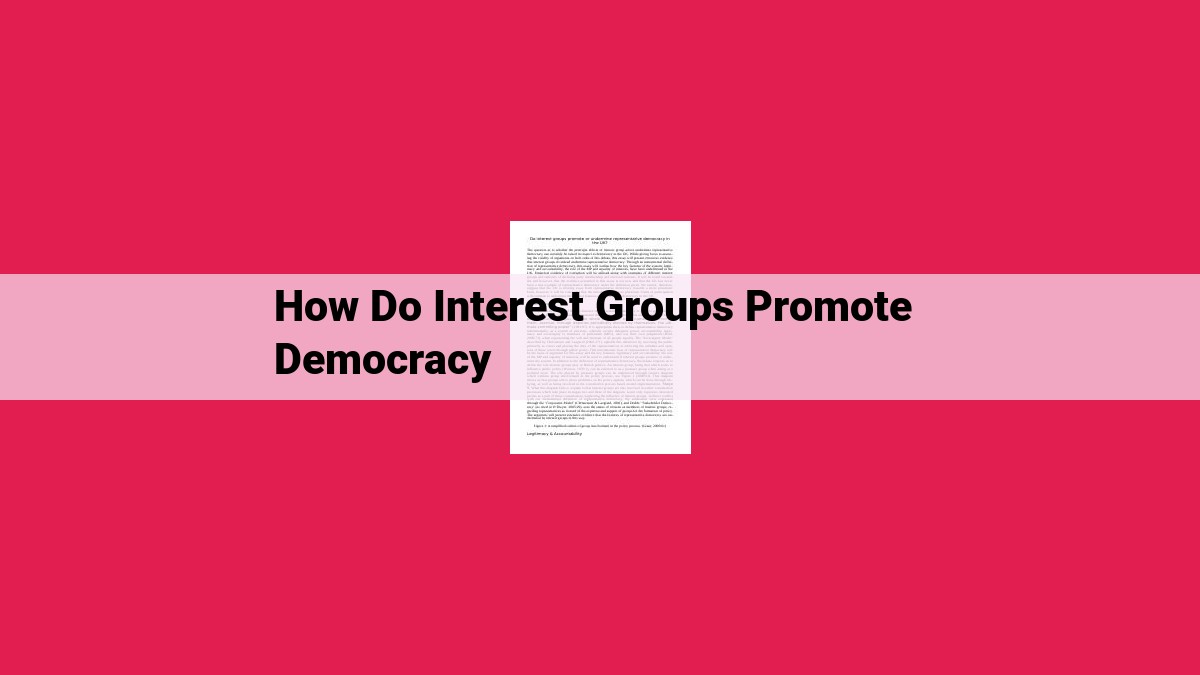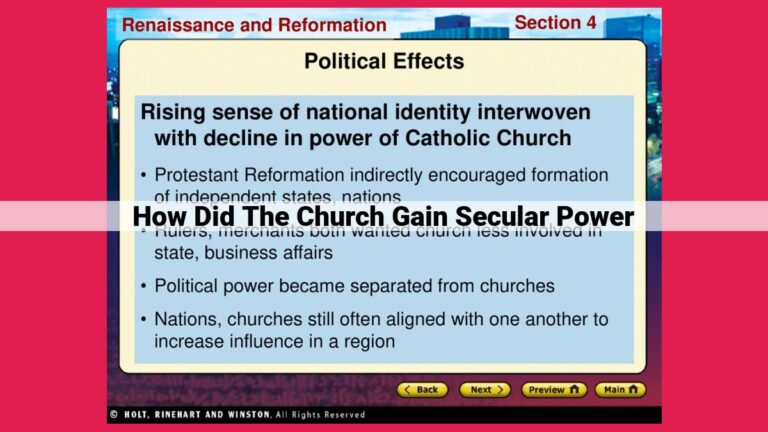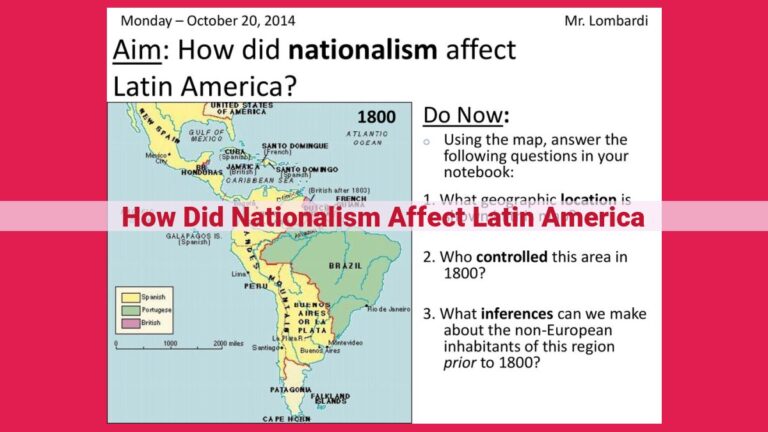The Role Of Interest Groups In Shaping A Vibrant And Representative Democracy

Interest groups promote democracy by advocating for policies, lobbying decision-makers, educating the public, mobilizing their base, and forging coalitions. They shape the political landscape by influencing legislators, fostering civic participation, and amplifying diverse voices. By engaging in these activities, interest groups contribute to a vibrant and representative democracy, ensuring that the needs of different constituencies are heard and considered.
Advocacy: Shaping the Political Landscape
In the vibrant tapestry of a democratic society, interest groups emerge as influential actors, shaping the course of political decisions. These organizations represent diverse interests, from environmental protection to economic prosperity, actively engaging in advocacy to amplify their voices and influence the decisions made by those in power.
Through a multifaceted approach that encompasses lobbying, education, and mobilization, interest groups exert their influence on the political landscape. They engage in direct dialogue with legislators, presenting their perspectives on specific policies and seeking to sway their votes. By providing informative resources and analysis to the public, they foster a deeper understanding of complex issues, empowering citizens to participate meaningfully in civic discourse. And when necessary, interest groups mobilize their supporters, orchestrating protests, campaigns, and other forms of direct action to ensure that their concerns are heard and addressed.
By building coalitions with like-minded organizations, interest groups enhance their collective strength and impact. These collaborative efforts bring together diverse perspectives, amplify messages, and increase pressure on decision-makers to consider the needs of the constituencies they represent. Through their advocacy efforts, interest groups play a crucial role in shaping the political landscape, ensuring that the voices of citizens from all walks of life are represented in the halls of power.
Lobbying: The Art of Direct Engagement with Lawmakers
In the intricate tapestry of political decision-making, interest groups play a pivotal role in shaping the destiny of public policies. One of their most potent tools is lobbying, a strategic form of direct engagement with politicians, legislative committees, and government agencies. Through lobbying, interest groups seek to influence policies that align with their interests and priorities.
Lobbyists, the skilled practitioners of this art, act as advocates for their clients, bridging the gap between external organizations and the halls of power. They tirelessly navigate the labyrinthine corridors of government, engaging with individual legislators, testifying before committees, and presenting their clients’ perspectives to decision-makers.
The success of any lobbying effort hinges on the lobbyist’s ability to build relationships, establish credibility, and present a compelling case. They must master the art of persuasion, crafting well-researched arguments and providing evidence to support their positions. In an era of increasing public scrutiny, transparency is crucial for lobbyists, as it bolsters trust and ensures the legitimacy of their activities.
Understanding the landscape of lobbying is essential. Interest groups may target various levels of government, from local city councils to state legislatures and the federal Congress. They can engage with elected officials, appointed policymakers, and even administrative agencies. The specific strategies and tactics employed by lobbyists vary depending on the target audience and the policy issues at hand.
Coordination and collaboration are often key to successful lobbying efforts. Interest groups may form coalitions with like-minded organizations to pool their resources, amplify their voices, and increase their leverage in the political process. By uniting their efforts, they can present a more formidable force and gain greater access to decision-makers.
Education: Empowering the Public
In the intricate tapestry of American democracy, interest groups play a pivotal role in informing the public about crucial issues and policies that shape our society. By disseminating knowledge, they illuminate the hidden workings of government, empower citizens, and foster civic participation.
Interest groups serve as conduits of information, translating complex policy debates into language that resonates with ordinary citizens. Through educational campaigns, they shedding light on issues that might otherwise remain obscure. Public service announcements, fact sheets, and social media campaigns allow groups to reach a broad audience, informing them about the implications of proposed legislation, proposed regulations, and other government actions.
By equipping the public with knowledge, interest groups enable informed decision-making. They ignite critical thinking, empowering citizens to engage thoughtfully with political processes and hold their elected officials accountable. An informed citizenry is the backbone of a healthy democracy, and interest groups play a vital role in educating and empowering the public.
Mobilization: Activating the Support Base
- Explain how interest groups rally their supporters to participate in protests, campaigns, and other forms of action to make their voices heard.
Mobilization: Activating the Support Base
When interest groups want their voices heard by decision-makers and the public, they mobilize their supporters to take action. This can come in many forms, from protests and rallies to letter-writing campaigns and boycotts. By coordinating their efforts, interest groups hope to amplify their message and influence the outcome of policy decisions.
One of the most visible forms of mobilization is protest. When an interest group feels strongly about an issue, they may organize a protest to draw attention to their cause. Protests can be large or small, and they can be peaceful or disruptive. The goal is always to make a statement and to show that the interest group has a significant number of supporters.
Another common form of mobilization is the letter-writing campaign. Interest groups often encourage their supporters to write letters to their elected officials, expressing their views on a particular issue. Letter-writing campaigns can be very effective, especially when they are coordinated and involve a large number of people.
Interest groups may also use boycotts to mobilize their supporters and pressure decision-makers. When a group boycotts a product or service, they are refusing to buy it in order to show their disapproval. Boycotts can be very effective in raising awareness of an issue and putting pressure on companies to change their policies.
Mobilization is an essential tool for interest groups. By activating their supporters, they can amplify their voices and influence the political process. Whether through protests, letter-writing campaigns, or boycotts, mobilization is a powerful way for interest groups to make their voices heard.
Coalition Building: Strengthening Influence in Advocacy
In the realm of advocacy, where interest groups vie for a voice in shaping policies, collaboration can amplify impact. Coalition building, the strategic alliance of diverse organizations with shared goals, has emerged as a powerful force in influencing decision-makers.
Combining Resources and Expertise
Uniting different perspectives and resources empowers coalitions to tackle complex issues effectively. By pooling their knowledge, skills, and financial capabilities, allied groups can enhance their collective capacity. This synergy enables them to conduct thorough research, launch comprehensive campaigns, and mobilize a broader base of support.
Representing Diverse Perspectives
Coalitions ensure that the voices of various stakeholders are heard in policy debates. By embracing a range of viewpoints, they bring a multifaceted understanding of issues to decision-makers. This inclusivity enriches the discussions and helps to craft policies that accommodate diverse societal needs.
Increasing Impact
The combined efforts of coalitions amplify their collective influence. When numerous organizations advocate for the same cause, their demands gain greater legitimacy and attention. By working together, they create a united front that is more difficult to ignore. Moreover, coalitions can leverage their collective membership to mobilize supporters, petition lawmakers, and raise public awareness.
Examples of Successful Coalitions
Throughout history, coalitions have played a pivotal role in shaping social and political landscapes. The Civil Rights Movement, for instance, brought together diverse organizations to fight for racial equality. Similarly, the anti-tobacco movement united health groups, advocacy organizations, and government agencies to reduce smoking rates and protect public health.
Benefits of Coalition Building
- Enhanced advocacy effectiveness
- Increased resources and expertise
- Broader representation of perspectives
- Greater impact on decision-makers
- Improved coordination and collaboration among like-minded organizations
In the ever-evolving landscape of advocacy, coalition building has become an essential strategy. By объединяя (uniting) their resources, perspectives, and efforts, interest groups can amplify their impact, influence decision-making, and ultimately create positive change in society. As the saying goes, “Together, we can achieve more than the sum of our individual parts.”





